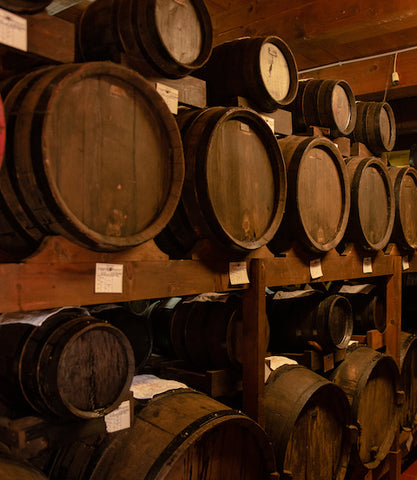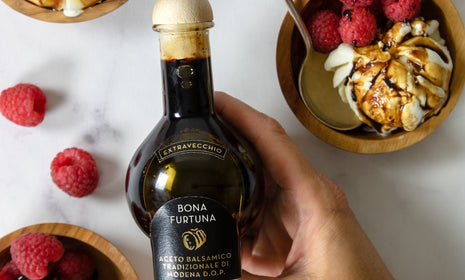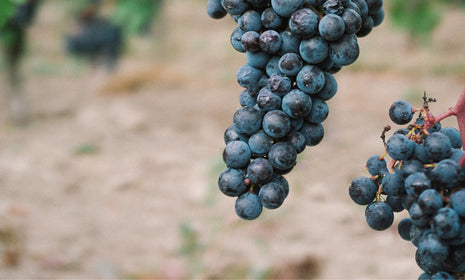The air is thick with must; a smell of wet wood and the sweetly-sour aromas of fermenting grapes permeates your skin delivering nuances and character from centuries past. From floor to ceiling, hues of wood bent, braced, and stained from decades of use fold you into a warm embrace. Barrels of oak and cedar adorn the walls, their iron bands cinched tightly to hold in the precious nectars within, allowing the gentle transference of characteristics from wood to the aceto balsamic vinegar as it ages gracefully. You’re handed a thimble of the syrupy, inky substance from within, and grant yourself a taste. Smooth and luscious with just a touch of bright citrus acidity running through it, the aged balsamic has a Sauterne-like sweetness. Surrounded by its scent, the notes of vanilla, cherry, and juniper are heightened on your palate.

Set into the neatly adorned and carefully planted vineyards of Modena stands the aceto balsamic vinegar house “Pedroni Acetaia”. Initially established as a tavern in 1862 by founder Giuseppe Pedroni, the name quickly became synonymous with aceto balsamic vinegar of Modena. Utilizing large empty beer casks made from oak to begin the fermenting process, and smaller Marsala casks made from chestnut, to carefully age his balsamic vinegar, Pedroni started a tradition for the production of the luscious and acidic vinegar that has been passed down from generation to generation within the Pedroni family. Today, Pedroni is managed and operated by a member of the sixth generation of the family.

Barrels of aged balsamic vinegar from the first generation of Pedroni production continue to be used today. Newer oak, chestnut, juniper, and cherry casks have also been added to the collection over the centuries, creating a family tree of aging barrels that impart layers of complexity and nuance to every balsamic they house. While the barrels used for the aging process of Pedroni’s balsamic vinegar are crucial to the final product, the grapes used are equally important. Hailing from neighboring Spain, Trebbiano di Spagna vines were first introduced to Modena in the 1600s. With its high sugar content and unique flavor, the grape quickly became a favorite varietal for the region. Due to their fragility, however, the grapes did not thrive for long in the region. Through careful growing practices, the Pedroni family managed to maintain their own vineyard of Trebbiano di Spagna, and they continue to cultivate and utilize the unique grapes that produce a dense and sweet must for their balsamic.
The Pedroni family history is one in a handful of similar legacies in Modena. The careful and sacred production of aceto balsamico tradizionale di Modena has been mindfully passed on through several generations of families. Before there were commercialized producers in Modena, households made their own balsamic to be gifted or even added to bridal dowries dating as far back as the eleventh century. Today, families in Modena continue in this tradition, gifting house-made balsamic vinegar to dear friends and family for special occasions.
Because of this heritage, and the importance that it plays for families like the Pedronis, the production of aceto balsamic vinegar of Modena is protected and carefully controlled. From the types of grapes used and the land in which they grow to the method of cooking and barrel aging the must, aceto balsamic vinegar from Modena is given various levels of certification to identify its quality and protect the integrity of their family’s heritage. While IGP certification allows for slightly more modernized technology to assist in the production of balsamic vinegar from Modena, DOP certifies the creme de la creme of the celebrated liquid mandating a minimum of 12 years of barrel aging and the use of strict techniques and ingredients. With their culture and heritage so intrinsically tied to food, there’s no wonder why Italians demand strict control over the distribution of their traditional flavors.

There’s no denying that true, aged balsamic vinegar from Modena is expensive. With centuries of dedication and labor behind each tangy, musty nuance, it really should be. Sweet, sour, musty, slightly smokey, and full of heavenly bright acidity, Bona Furtuna aged balsamic vinegar offers a profoundly delicious taste of Italian tradition. Try it with fresh fruits and vegetables, creamy cheeses, ice cream, and fatty cuts of meat. With its bold and balanced characteristics, it really is a welcome addition to any meal. Mangiamo.





Be the first to comment